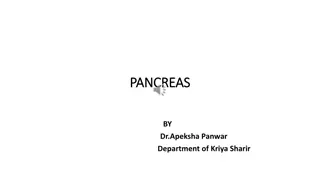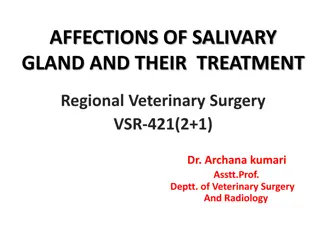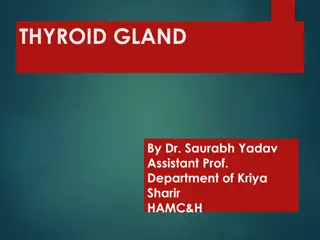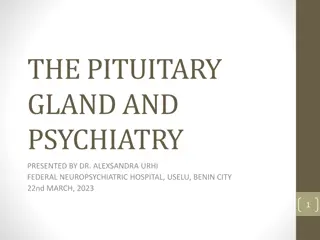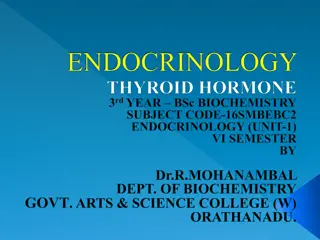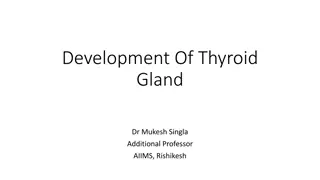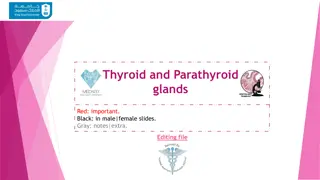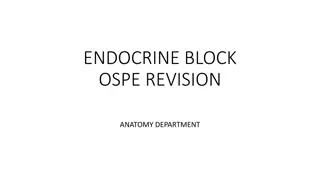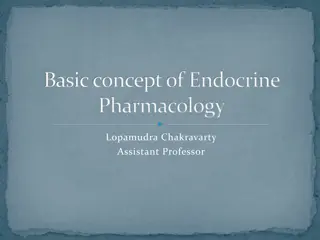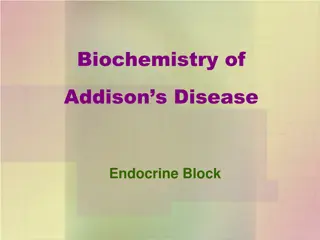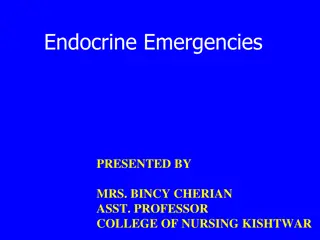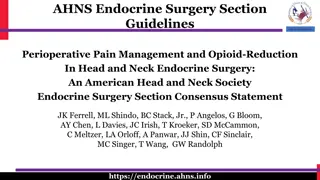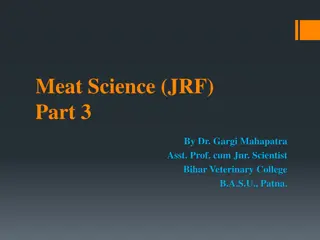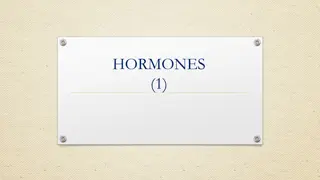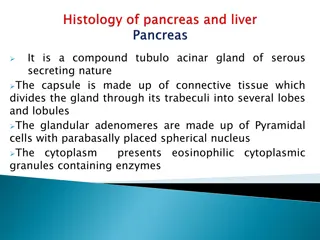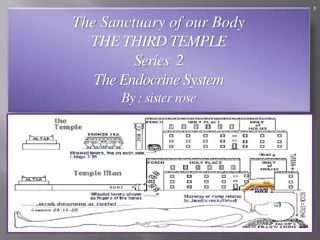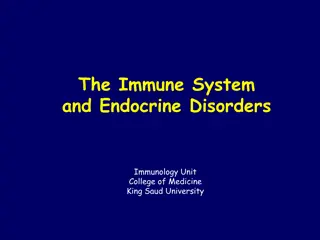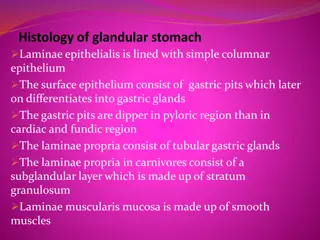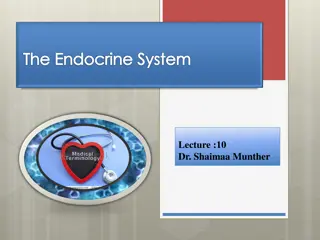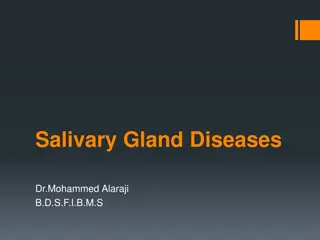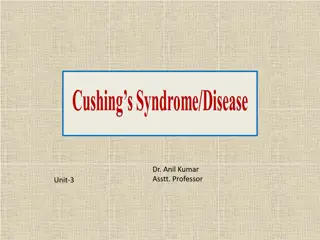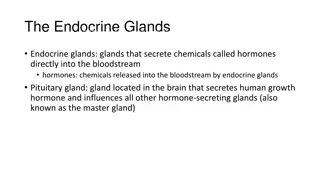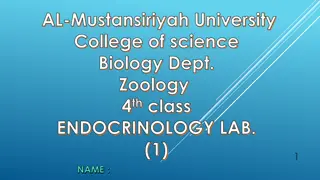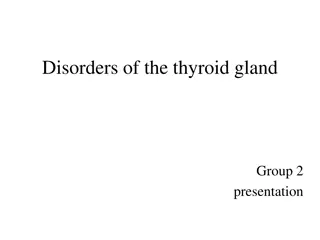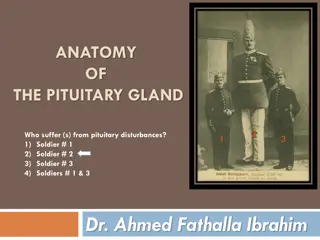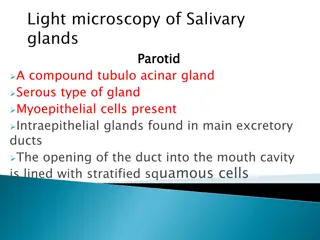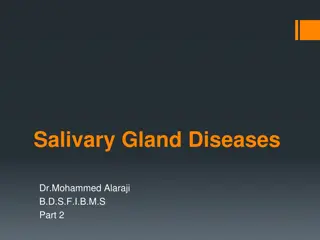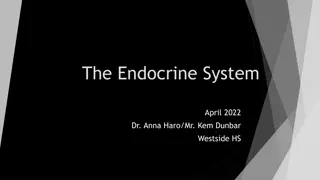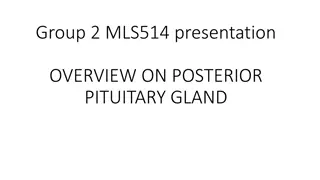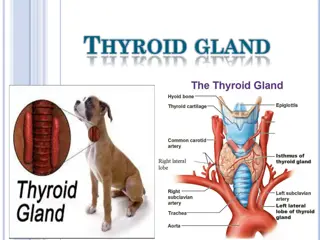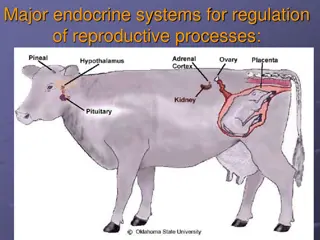Understanding Pituitary Gland Functions in Endocrinology Course
Explore the intricate workings of the pituitary gland in endocrinology, delving into hypo- and hyperfunction aspects, hormonal regulation, and physiological characteristics. Learn about the crucial role of hormones, their actions on target organs, and the specificity of their interactions with cellu
6 views • 71 slides
SALIVARY GLAND IMAGING
Salivary gland imaging plays a crucial role in diagnosing and monitoring diseases of the major salivary glands, including the parotid, submandibular, and sublingual glands. Different imaging techniques such as computed tomography, MRI, and ultrasound are used to visualize these glands and aid in dif
1 views • 12 slides
Adrenal Gland
This content delves into the detailed structure and function of the adrenal gland, focusing on the differentiation between the cortex and medulla, the histological features of each zone, and the hormones produced. From the distinction of various cortical layers to the role of chromaffin cells in the
0 views • 8 slides
Comprehensive Overview of Pancreas Function and Structure
Pancreas is a vital organ in the abdomen with dual exocrine and endocrine functions. As an exocrine organ, it secretes digestive enzymes and bicarbonates into the duodenum for food breakdown. In its endocrine role, the pancreas regulates blood sugar levels by secreting insulin, glucagon, somatostati
1 views • 16 slides
Affections of Salivary Glands in Veterinary Surgery: Overview and Treatment
Salivary gland affections in animals, particularly dogs, are discussed, highlighting the main pairs of salivary glands and their locations. The content covers details on the parotid, mandibular, sublingual, and zygomatic glands, along with their respective ducts. Information on congenital and acquir
0 views • 28 slides
Understanding the Thyroid Gland: Functions and Hormone Synthesis
The thyroid gland is a vital endocrine gland located below the larynx, responsible for producing thyroid hormones essential for regulating metabolism. This gland consists of follicles lined with follicular cells, producing thyroglobulin and thyroid hormones T3 and T4. Iodine plays a crucial role in
0 views • 40 slides
Understanding the Pituitary Gland: Implications in Psychiatry
This presentation by Dr. Alexsandra Urhi delves into the anatomy, function, and psychiatric implications of the pituitary gland. It explores the interplay between endocrine structures, the CNS, and psychotropic drugs' effects on the pituitary gland.
0 views • 35 slides
Overview of Pituitary Gland: Structure, Function, and Relationships
The pituitary gland, also known as the hypophysis, is an endocrine gland located at the base of the brain. It is divided into two main parts: the adenohypophysis and the neurohypophysis. The gland plays a crucial role in hormone regulation and is closely related to neighboring structures such as the
0 views • 26 slides
Understanding Thyroid Hormones and Their Role in Metabolism
Thyroid hormones, including triiodothyronine (T3) and thyroxine (T4), are essential for regulating metabolism, growth, development, body temperature, and heart rate. They are tyrosine-based hormones produced by the thyroid gland, requiring iodine for synthesis. T3 affects various physiological proce
2 views • 17 slides
Overview of Human Endocrine System in Life Sciences Presentation
This content provides a detailed examination guideline for understanding the human endocrine system in the field of life sciences. It covers essential topics such as the difference between endocrine and exocrine glands, hormone functions, gland locations with functions, and key terminology related t
1 views • 17 slides
Development of Thyroid Gland in Embryonic Stage
The thyroid gland is the first endocrine gland to develop in the human body, starting from a median endodermal thickening in the primitive pharynx. The process involves the descent of the thyroid diverticulum and formation of lobes by week 7 of embryonic development. The thyroid gland begins functio
0 views • 24 slides
Thyroid and Parathyroid Glands Histological Structure Overview
This detailed histological study covers the structure and function of the thyroid and parathyroid glands. It includes information on the stroma, parenchyma, follicular cells, parafollicular cells, and the microscopic structure of the parathyroid gland. The article also delves into the functions of v
0 views • 8 slides
Endocrine Block OSPE Revision - Anatomy Department Presentation Slides
Explore this set of presentation slides prepared by the Anatomy Department for Endocrine Block OSPE Revision. The slides cover essential topics related to endocrine anatomical structures and functions, providing a comprehensive resource for revision and review.
0 views • 11 slides
Understanding Glands: Endocrine and Exocrine Systems
Glands play a crucial role in the body by producing and releasing substances for specific functions. Endocrine glands release hormones directly into the bloodstream, while exocrine glands secrete substances through ducts onto bodily surfaces. Different types of exocrine glands, such as sweat glands,
3 views • 22 slides
Understanding the Biochemistry of Addison's Disease in the Endocrine System
Addison's Disease, a primary adrenocortical hypofunction, involves the adrenal gland's cortex and its hormone synthesis. The condition affects aldosterone and cortisol production, impacting electrolyte balance and blood pressure regulation. Learn about the anatomical and histological aspects of the
0 views • 21 slides
Understanding Endocrine Emergencies and Diabetes Mellitus
The endocrine system plays a crucial role in regulating various bodily functions through hormone release. This presentation by Mrs. Bincy Cherian delves into endocrine emergencies, specifically focusing on Diabetes Mellitus. It explains the differences between Type I and Type II diabetes, their clin
3 views • 28 slides
AHNS Endocrine Surgery Section Guidelines: Perioperative Pain Management and Opioid Reduction
The American Head and Neck Society Endocrine Surgery Section provides consensus statements on perioperative pain management and opioid reduction in head and neck endocrine surgery. Addressing the opioid addiction crisis, the expert panel offers guidelines on pain management strategies, opioid prescr
0 views • 18 slides
Understanding the Microscopic Structure and Function of the Pituitary Gland
Explore the detailed histology of the pituitary gland, focusing on its adenohypophysis and neurohypophysis components. Learn about the diverse parenchymal cells, including acidophils, basophils, and chromophobes, and their respective functions in hormone production. Dive into the significance of the
0 views • 6 slides
Utilization of Glands and Biochemicals in Meat Science Research
Glands play a crucial role in meat science research, with various organs such as pancreas, adrenal glands, and parathyroid gland providing valuable biochemicals like insulin, thyroxine, and corticosteroids. The extraction methods and applications of these glands in food science and medicine are deta
0 views • 25 slides
Understanding Hormones and their Role in the Body
Hormones are chemical messengers that play a crucial role in regulating various metabolic functions in the body. They are transported through the bloodstream to tissues and organs, affecting processes like growth, metabolism, and reproduction. Some hormones have autocrine and paracrine effects in ad
0 views • 25 slides
Structure and Function of a Serous Compound Tubulo-acinar Gland
A detailed description of a compound tubulo-acinar gland with serous-secreting nature is provided, highlighting its cellular composition, arrangement of ducts, and connective tissue organization. The glandular structure, including adenomeres, centroacinar cells, and myoepithelial cells, is discussed
0 views • 15 slides
Exploring the Endocrine System as the Third Temple of our Body
Delve into the fascinating connections between the endocrine system and biblical references, likening its functions to the operations of the Tribe of Asher. Discover how this system, composed of glands producing hormones, impacts growth, metabolism, and sexual development. Explore the intricate netw
0 views • 24 slides
Understanding the Interplay of the Immune System and Endocrine Disorders
Explore the intricate mechanisms of immunological damage to endocrine glands, focusing on disorders like Graves disease, Hashimoto's thyroiditis, type I diabetes, and Addison's disease. Delve into the association of autoantibodies with pathogenic and diagnostic significance, uncovering the complexit
0 views • 33 slides
Endocrine Potpourri: Adrenal Insufficiency and Incidentalomas - Case-Based Review
This endocrine potpourri covers various cases involving adrenal insufficiency, adrenal crisis, adrenal incidentalomas, and patient education. It includes a detailed case presentation, treatment guidelines for adrenal crisis, patient education on adrenal insufficiency, and evaluation of adrenal nodul
0 views • 62 slides
Structure of Gastric Mucosa in Glandular Stomach
The glandular stomach features laminae epithelialis lined with simple columnar epithelium, leading to differentiation into gastric pits and glands. The laminae propria houses tubular gastric glands, while the laminae muscularis mucosa is composed of smooth muscles. Different regions exhibit distinct
0 views • 14 slides
Understanding the Endocrine System: Key Concepts and Functions
The endocrine system, consisting of glands that release hormones into the bloodstream, plays a crucial role in regulating various body processes like metabolism, growth, reproduction, and stress response. Key glands include the pituitary, thyroid, pancreas, adrenal, ovaries, and testes, each produci
0 views • 34 slides
Comprehensive Overview of Salivary Gland Diseases and Management
Salivary gland diseases encompass various conditions affecting the salivary glands, including developmental abnormalities, inflammatory and non-inflammatory enlargement, cysts, tumors, and dysfunction. Investigations such as plain films, sialography, MRI, and biopsies are essential for diagnosis. Si
0 views • 49 slides
Understanding Cushing Disease in Dogs and Cats
The pituitary gland, or "Master Gland," plays a crucial role in hormone regulation in the body. Cushing disease, a common endocrine disorder in middle-aged to older dogs and cats, is often caused by tumors in the pituitary or adrenal glands. Symptoms include increased thirst, appetite, panting, obes
0 views • 22 slides
Understanding How Hormones Interact: The Endocrine System
The endocrine system comprises glands that release hormones into the bloodstream, influencing various bodily functions. Key glands include the pituitary, pineal, thyroid, pancreas, gonads, and adrenal glands, each playing a crucial role in regulating metabolism, growth, stress response, and reproduc
0 views • 5 slides
Understanding the Endocrine System: Hormones, Glands, and Regulation
The endocrine system, comprising glands such as the pituitary, thyroid, pancreas, and more, produces hormones that regulate various bodily functions. These hormones target specific cells with receptors, influencing metabolism, growth, energy usage, and more. By understanding how hormones interact wi
0 views • 12 slides
Understanding Disorders of the Thyroid Gland: Group 2 Presentation
The thyroid gland, a vital part of the endocrine system, produces hormones that regulate metabolic processes, energy expenditure, and tissue growth. Dysfunction of the thyroid can lead to various disorders affecting overall health. Learn about the functions of thyroid hormones, diagnostic tests, and
0 views • 39 slides
Understanding the Pituitary Gland: Anatomy, Functions, and Disorders
The pituitary gland, also known as the master endocrine gland, plays a crucial role in regulating various hormonal functions in the body. Learn about its anatomy, position, subdivisions, important relations, and common disturbances. Explore how soldiers and individuals like them can be affected by p
0 views • 17 slides
Overview of Salivary Glands Structure
Salivary glands play a crucial role in the production and secretion of saliva, aiding in digestion and oral health. The parotid gland is a compound tubuloacinar gland with serous characteristics, while the sublingual gland is a seromucous type. Minor salivary glands, found in carnivores, vary in com
0 views • 16 slides
Understanding the Endocrine System: Functions, Organs, and Disorders
The endocrine system, essential for bodily functions and growth, consists of key parts such as the hypothalamus, pituitary gland, thyroid gland, and more. It helps maintain homeostasis and can be affected by environmental factors like drugs and stress, leading to conditions such as Cushing syndrome.
0 views • 9 slides
Overview of Salivary Gland Tumors and Diseases
Salivary gland diseases, including tumors, can affect both major and minor glands. These tumors may be benign or malignant, with common benign tumors like pleomorphic adenoma. Clinical features of salivary gland tumors vary, with slow-growing benign tumors being more common. Pleomorphic adenoma is p
0 views • 27 slides
Understanding the Endocrine System: Functions and Glands Explained
Explore the intricacies of the endocrine system with a focus on its functions such as metabolism, growth, emotions, and more. Learn about key endocrine glands like the hypothalamus and pituitary, their roles in hormone regulation, and their impact on various bodily processes. Discover the significan
0 views • 17 slides
Understanding the Posterior Pituitary Gland and Its Hormones
The posterior pituitary gland, a key part of the endocrine system, plays a vital role in hormone secretion. It controls the release of oxytocin and vasopressin, influencing social bonding, reproduction, and childbirth. Learn about the anatomy, function, and disorders associated with this important g
0 views • 26 slides
Overview of the Human Endocrine System
This presentation covers the terminology, differences between exocrine and endocrine glands, the location and functions of various glands in the endocrine system, and general information on how hormones coordinate the body's organs to maintain homeostasis.
0 views • 17 slides
Understanding the Thyroid Gland: Structure, Hormones, and Function
The thyroid gland, a butterfly-shaped structure located on the ventral surface of the trachea, secretes hormones essential for regulating metabolic rate, growth, and development. It produces hormones like Tetraiodothyronine T4, Triiodothyronine T3, and Calcitonin, which play crucial roles in maintai
0 views • 21 slides
Endocrine Systems in Reproductive Regulation
The endocrine system plays a crucial role in regulating reproductive processes by secreting hormones that influence cellular activity. This system involves ductless glands like the hypothalamus, pituitary gland, and other endocrine glands working together in a feedback mechanism. Hormones of various
0 views • 19 slides



